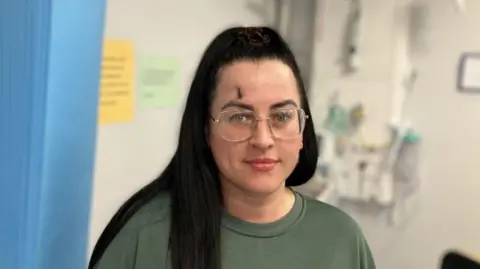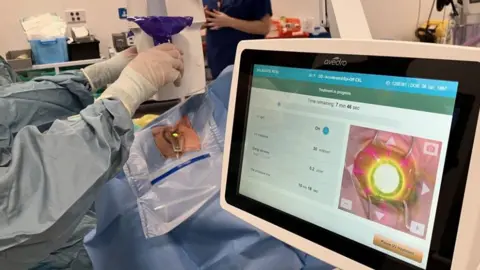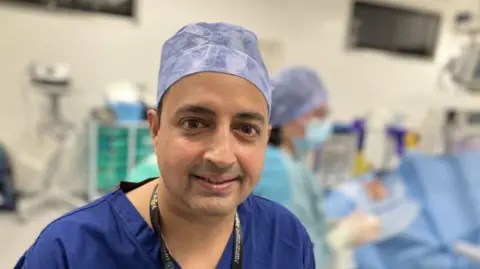New procedure to help save eyesight of patients
 BBC
BBCPatients in Somerset with a "debilitating" condition that causes blurred vision can now access treatment that prevents progression of the condition.
Keratoconus, which causes the cornea to thin, normally develops during teenage years or early adulthood and tends to gradually worsen over time.
A new procedure has been introduced at Taunton's Musgrove Park Hospital in Somerset to treat patients – called corneal cross-linking.
Patient Ruta Balakit from Bridgwater said: "I am happy it is hear I don't need to go far away for treatment - that is really good."
Warning: This article contains a graphic image below of an eye procedure
Keratoconus is a type of corneal ectasia, where the round clear window of a patient's eye becomes progressively thin, causing it to become cone shaped and irregular.
The speed and severity of change in vision is most common in people with connective tissue diseases, allergic eye disease, conditions such as Down's Syndrome, and children with learning difficulties or autism.
Ms Balakit has also recently had the procedure after discovering she had a problem with her vision a year ago.
The 38-year-old said: "My eyes were quite itchy mostly in the evenings.
"Even sometimes it would wake me up. I started to think what's wrong?"
After a check up at Specsavers, Ms Balakit was referred to hospital.

The cross-linking procedure helps fix it by removing the surface layer of the cornea (the epithelium) and then placing riboflavin drops onto the eye which are excited by using UV light and then form free radicals.
Those free radicals lead to covalent bonds forming within the cornea making it stronger.
It is the only treatment available that stops keratoconus from getting worse, and has a 95% success rate, with only 5% of patients going on to need further treatment, according to NHS figures.
Patients with keratoconus will no longer need a lifetime supply of contact lenses, which tended to cost the NHS £600 per patient, per year, over their lifetime.
Somerset NHS Foundation Trust is the only trust in the South West area to offer the procedure.

Mr Indy Sian, consultant ophthalmologist at Musgrove Park Hospital, said: "Historically, our patients have needed to be seen at a specialist clinic in London to have this treatment, which was understandably very difficult for young families, or those individuals with additional needs.
"Patients with a learning disability or Down's Syndrome may struggle to understand the whole process, so being able to have their treatment in a more familiar setting will be to their advantage.
"It will also make subsequent follow-up care much easier."
He added the condition can have a "debilitating effect" on people's lives, as it can impact schooling, lead to other injuries through falls and can lead to needing a corneal transplant.
"Being able to offer this cross-linking procedure here in Somerset means we have an effective way of stabilising a patient's sight, so it does not get any worse over the years, and it can even improve the sight in some cases," Mr Sian added.
Update 10 March 2025: Changes have been made to this story for editorial reasons.
Follow BBC Somerset on Facebook and X. Send your story ideas to us on email or via WhatsApp on 0800 313 4630.
